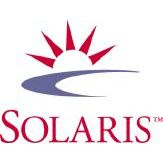 Solaris is the Unix-based operating system developed by Sun Microsystems, displays that company's ability to be innovative and flexible. Solaris, one could argue, is perpetually ahead of the curve in the computer world. Sun continually adapts to the changing computer environment, trying to anticipate where the computer world is going, and what will be needed next, and develops new versions of Solaris to take that into account.
Solaris is the Unix-based operating system developed by Sun Microsystems, displays that company's ability to be innovative and flexible. Solaris, one could argue, is perpetually ahead of the curve in the computer world. Sun continually adapts to the changing computer environment, trying to anticipate where the computer world is going, and what will be needed next, and develops new versions of Solaris to take that into account.Solaris was born in 1987 out of an alliance between AT&T and Sun Microsystems to combine the leading Unix versions (BSD, XENIX, and System V) into one operating system. Four years later in 1991, Sun replaced it's existing Unix operating system (SunOS 4) with one based on SVR4. This new OS, Solaris 2, contained many new advances, including use of the OpenWindows graphical user interface, NIS+, Open Network Computing (ONC) functionality, and was specially tuned for symmetric multiprocessing.
This kicked off Solaris' history of constant innovation, with new versions of Solaris being released almost annually over the next fifteen years. Sun was constantly striving to stay ahead of the curve, while at the same time adapting Solaris to the existing, constantly evolving wider computing world. The catalogue of innovations in the Solaris OS are too numerous to list here, but a few milestones are worth mentioning. Solar 2.5.1 in 1996 added CDE, the NFSv3 file system and NFS/TCP, expanded user and group IDs to 32 bits, and included support for the Macintosh PowerPC platform. Solaris 2.6 in 1997 introduced WebNFS file system, Kerberos 5 security encryption, and large file support to increase Solaris' internet performance.
Solaris 2.7 in 1998 (renamed just Solaris 7) included many new advances, such as native support for file system meta-data logging (UFS logging). It was also the first 64-bit release, which dramatically increased its performance, capacity, and scalability. Solaris 8 in 2000 took it a step further was the first OS to combine datecentre and dot-com requirements, offering support for IPv6 and IPSEC, Multipath I/O, and IPMP. Solaris 9 in 2002 saw the writing on the wall of the server market, dropped OpenWindows in favour of Linux compatibility, and added a Resource Manager, the Solaris Volume Manager, extended file attributes, and the iPlanet Directory Server.
Solaris 10, the current version, was released to the public in 2005 free of charge and with a host of new developments. The latest advances in the computing world are constantly being incorporated in new versions of Solaris 10 released every few months. To mention just a few, Solaris features more and more compatibility with Linux and IBM systems, has introduced the Java Desktop System based on GNOME, added Dynamic Tracing (Dtrace), NFSv4, and later the ZFS file system in 2006.
Also in 2006, Sun set up the OpenSolaris Project. Within the first year, the OpenSolaris community had grown to 14,000 members with 29 user groups globally, working on 31 active projects. Although displaying a deep commitment to open-source ideals, it also provides Sun with thousands of developers essentially working for free.
The development of the Solaris OS demonstrates Sun Microsystems' ability to be on the cutting edge of the computing world without losing touch with the current computing environment. Sun regularly releases new versions of Solaris incorporating the latest development in computer technology, yet also included more cross-platform compatibility and incorporating the advances of other systems. The OpenSolaris project is the ultimate display of these twin strengths-Sun has tapped into the creative energy of developers across the world and receives instant feedback about what their audience wants and needs. If all software companies took a lesson from Sun, imagine how exciting and responsive the industry could be.








wonderful blog
ReplyDeletecomment on mine if u plz and try the traffic system
www.theway2profits.blogspot.com
Best discussion on the solaris history, i like such articles from beginning or borning a thing to its current situation.
ReplyDeleteHi! Do you know if they make any plugins to assist with Search Engine Optimization?
ReplyDeleteI'm trying to get my blog to rank for some targeted keywords but
I'm not seeing very good success. If you know of any please share.
Kudos!
Feel free to surf to my weblog ... free skip tracing